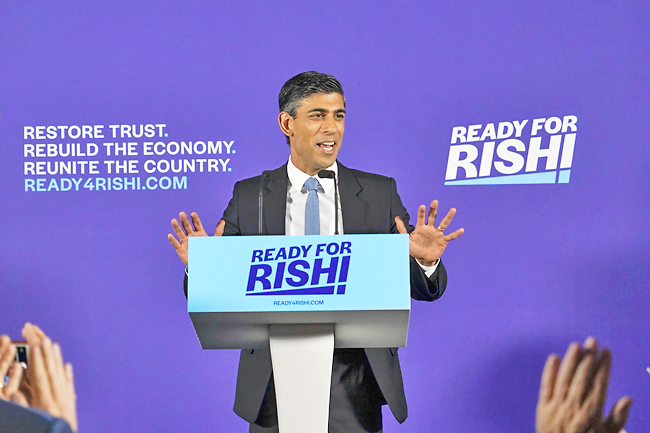Danica Kirka
LONDON (AP) – Harmeet Singh Gill was excited to hear that Rishi Sunak would become Britain’s first prime minister of colour – news that came as he celebrated the Diwali festival in a London neighbourhood sometimes called Little India.
“It’s almost a watershed moment,” the 31-year-old said as he volunteered at the cavernous dome-topped house of worship that serves the Sikh community in west London’s Southall neighbourhood.
“It’s just a sign of 21st- Century Britain, where it doesn’t matter what background you’re from now, that you can rise the ranks to the positions of power.”
But, for many people of colour in the United Kingdom (UK), it’s not so simple. Sunak, 42, will be the first Hindu and the first person of South Asian descent to lead the country, which has a long history of colonialism and has often struggled to welcome immigrants from its former colonies – and continues to grapple with racism and wealth inequality.
King Charles III asked Sunak, of South Asian descendants to form a new government on Tuesday. The milestone is doubly significant for many people with Asian roots because it comes during Diwali, the five-day festival of light celebrated by Hindus, Sikhs and Jains.

Earlier this year, Sunak, a practising Hindu, spoke about the significance of lighting Diwali candles outside the official Downing Street residence of the Chancellor of the Exchequer, the post he held for two years until he resigned in July.
“It was one of my proudest moments that I was able to do that on the steps of Downing Street,” he told the Times of London. “And it meant a lot to a lot of people and it’s an amazing thing about our country.”
It wasn’t always that way in Britain.
Sunak’s win is evidence of this progress – a step toward something better, said director of the Centre for the Study of Ethnicity and Citizenship at the University of Bristol, Tariq Modood.
“I would say the most important thing about today is that the majority, the overwhelming majority of Conservative members of Parliament, chose as their first choice a youngish man of Indian descent, making him the first British prime minister of colour,’’ he said on Monday.
“And I think that other parties will note that, the Labour Party most certainly, and will want to catch up with that, if not try and do better.”
But Sunak isn’t typical of the millions of people from Asian, African and Caribbean backgrounds who still face barriers to employment and education.
The son of a doctor and a pharmacist, Sunak earned an undergraduate degree from the University of Oxford and a master’s in business administration from Stanford University before going to work for Goldman Sachs and then moving into the hedge fund industry, where he made a fortune in finance.
He is married to Akshata Murty, daughter of Indian billionaire NR Narayana Murthy, founder of the global information technology company Infosys.
Sunak was criticised earlier this year when British news media reported that his wife took advantage of rules allowing her to avoid UK taxes on her foreign income. She has since promised to give up her “non-domiciled” status and pay all her taxes in Britain.
The first Muslim woman to attend Cabinet when she served in former Prime Minister David Cameron’s government, Baroness Sayeeda Warsi said she thought Sunak would be a unifying figure for all British Asians.
“But there has been a huge debate on whether or not this is something that we should celebrate, and I think we do celebrate the fact that this is visible diversity,” Warsi told the BBC.
“But it has to go beyond visible diversity. There have to be young children today from poor homes, going to ordinary state schools, who say that they, too, could become prime minister.”
Director of British Future, a think tank focused on immigration, identity and race, Sunder Katwala called Sunak’s victory a “historic moment” that wouldn’t have been possible just a decade ago. But, he said, the struggle to end discrimination isn’t over.
“I hope that Sunak will acknowledge that not everybody has enjoyed his advantages in life,” Katwala said. “Rishi Sunak reaching 10 Downing Street does not make Britain a perfect meritocracy. While there is more to do, this is a hopeful sign of progress against the prejudices of the past.”
Columnist for the Times of London, Sathnam Sanghera said Sunak’s promotion was “amazing” as he recalled the hatred and violence faced by Black and Asian people in Britain in the past.
“Some people on the left appear to be reluctant to say it, but it is undeniably a great thing that, in Rishi Sunak, Britain has its first brown prime minister,” Sanghera wrote. “Frankly, I never expected to see such a thing in my lifetime.”
But while Sunak’s success will boost the aspirations of young people throughout Britain, more work needs to be done, Sanghera said.
“Just because we have one British Hindu in charge, and just because some brown ethnic groups are doing well, it doesn’t mean that Britain has defeated racism,” he wrote. “No more than Barack Obama’s election as president represented the defeat of racism in America.”
But shopkeeper Pratik Shah was optimistic about the potential for Sunak’s leadership.


